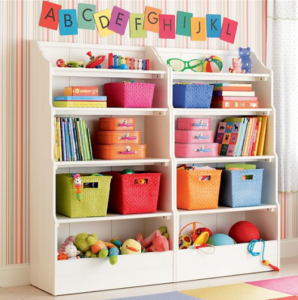How Order Can Inspire Your Kid
 For the most part, right brain kids don’t like to take the time out of their free-spirited play to organize. This can be a big negative because they can get overwhelmed and lose sight of what they were supposed to be doing. Be intentional about having them organize things around them. Start with simple things like their sock drawer or book shelves and eventually more of their room and personal belongings. Learning to organize the physical space around them will help develop order in their thinking too.
For the most part, right brain kids don’t like to take the time out of their free-spirited play to organize. This can be a big negative because they can get overwhelmed and lose sight of what they were supposed to be doing. Be intentional about having them organize things around them. Start with simple things like their sock drawer or book shelves and eventually more of their room and personal belongings. Learning to organize the physical space around them will help develop order in their thinking too.
These are some of the things I think about when organizing for kids, or myself:
- Prepare the environment. Get things ready in the room before the activity begins. To get started, look at the structure of the room, the furniture, the way the room is used and consider ways to make it more effective.
- Shelves, Drawers, Baskets and Boxes are your friends. To create order and a more successful play space, put up a few shelves. Be sure they’re at a comfortable height for your child. Place toys and play sets in baskets and boxes to help make choices visible and keep pieces together. Don’t forget to add labels!
- Encourage Cleanup and Consistency. Now that you’ve created an organized space, be sure to teach your child how to use it and maintain it. Encourage one toy or activity at a time, be sure they know how to put things back before starting something new, and be the one to help maintain the order.
Here are some other ideas for controlling the chaos that seems to follow your right brain thinker.
- Make a list. Right brainers have racing minds. It’s easy to get frustrated when you think your kids aren’t listening or forget easily. Making to do lists, will help them stay focused and be able to complete tasks more effectively. With very young kids, keep the lists to three to five items and use pictures instead of words. With older kids use lists for chores, homework and help tracking their schedules.
- Make a plan – and stick to it. Our right brain kids are spontaneous but that’s not always such a good thing. And when they do have a plan, they are easily convinced to leave it behind. But it’s important for our kids to be able to make a plan and stick to it. Choose an upcoming activity or homework assignment and help your student plan it out. Decide steps, dates and times. Make a list so they can check it off as they work through it.
By doing these simple things, your child will have so much more time to create and implement those great ideas swimming around in their minds.










